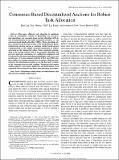Consensus-Based Decentralized Auctions for Robust Task Allocation
Author(s)
Choi, Han-Lim; Brunet, Luc; How, Jonathan P.
DownloadChoi_Consensus-Based-Decentralized.pdf (594.5Kb)
PUBLISHER_POLICY
Publisher Policy
Article is made available in accordance with the publisher's policy and may be subject to US copyright law. Please refer to the publisher's site for terms of use.
Terms of use
Metadata
Show full item recordAbstract
This paper addresses task allocation to coordinate a fleet of autonomous vehicles by presenting two decentralized algorithms: the consensus-based auction algorithm (CBAA) and its generalization to the multi-assignment problem, i.e., the consensus-based bundle algorithm (CBBA). These algorithms utilize a market-based decision strategy as the mechanism for decentralized task selection and use a consensus routine based on local communication as the conflict resolution mechanism to achieve agreement on the winning bid values. Under reasonable assumptions on the scoring scheme, both of the proposed algorithms are proven to guarantee convergence to a conflict-free assignment, and it is shown that the converged solutions exhibit provable worst-case performance. It is also demonstrated that CBAA and CBBA produce conflict-free feasible solutions that are robust to both inconsistencies in the situational awareness across the fleet and variations in the communication network topology. Numerical experiments confirm superior convergence properties and performance when compared with existing auction-based task-allocation algorithms.
Date issued
2009-06Department
Massachusetts Institute of Technology. Department of Aeronautics and AstronauticsJournal
IEEE Transactions on Robotics
Publisher
Institute of Electrical and Electronics Engineers
Citation
Han-Lim Choi, L. Brunet, and J.P. How. “Consensus-Based Decentralized Auctions for Robust Task Allocation.” Robotics, IEEE Transactions on 25.4 (2009): 912-926. © 2009 Institute of Electrical and Electronics Engineers
Version: Final published version
ISSN
1552-3098
Keywords
Distributed robot systems, networked robots, task allocation for multiple mobile robots